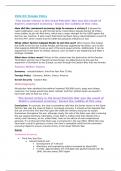Other
Essay Plans for Chapter 6 (1941-53) Russia 2N AQA A Level History
Covers essay plans for Chapter 6 of the revision guide, including conclusions, detailed essay plans, and more!! This was created following: https://youtu.be/lr6PcpTJPkk?si=eLInvNThQUC2MJEM This is available as part of a bundle if you'd be interested in the whole course of other parts of it!
[Show more]




